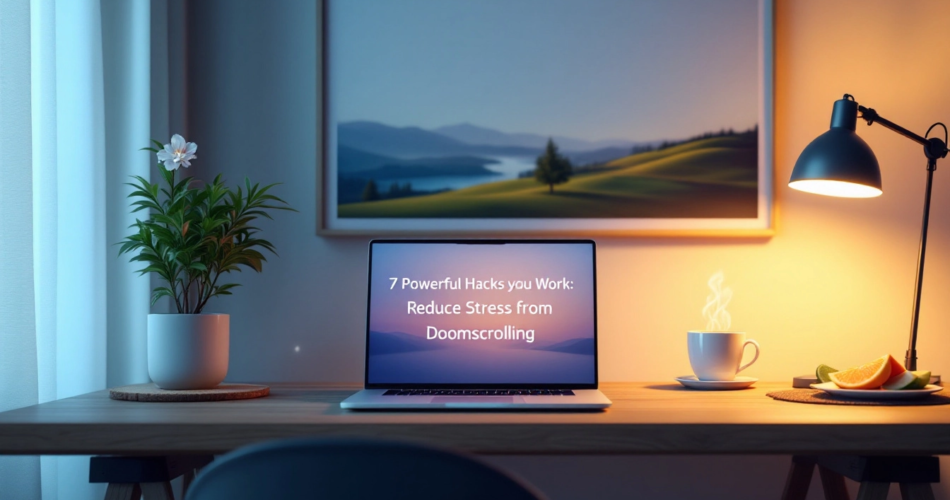Have you ever caught yourself endlessly scrolling through a sea of negative news on your phone, only to feel overwhelmed and stressed afterward? You’re not alone. In fact, studies show that excessive doomscrolling—consuming bad news online for extended periods—has skyrocketed in recent years. While staying informed is important, constant exposure to negative news can take a significant toll on your mental and even physical health. The good news? You can regain control. In this guide, we’ll explore 7 powerful hacks to help you reduce stress from doomscrolling and protect your well-being.
Table of Contents
- What Is Doomscrolling and Why Does It Stress Us Out?
- Hack #1 – Set Clear Boundaries on Your Screen Time
- Hack #2 – Practice Mindfulness to Curb the Urge
- Hack #3 – Diversify Your Content Consumption
- Hack #4 – Harness Technology to Limit Doomscrolling
- Hack #5 – Find a Positive Replacement Activity
- FAQs About Reducing Stress from Doomscrolling
What Is Doomscrolling and Why Does It Stress Us Out?
Defining Doomscrolling and Its Link to Anxiety
Doomscrolling refers to the act of obsessively scrolling through bad news, even when it makes you feel worse. It’s a behavior most of us are guilty of, often driven by the need to stay informed during uncertain times.
The Mental and Physical Toll of Constant Exposure to Negative News
Repeated exposure to distressing content can lead to heightened anxiety, stress, and even depression. Over time, it also affects your ability to focus and maintain a positive outlook on life.
How Doomscrolling Activates Our Fight-or-Flight Response
Consuming disturbing news triggers the body’s fight-or-flight response, flooding it with stress hormones like cortisol. This can leave you feeling physically exhausted and emotionally drained.
Hack #1 – Set Clear Boundaries on Your Screen Time
Use Time Management Tools to Track Your Daily Phone Usage
Apps like Moment or Screen Time can help you monitor and reduce the time you spend scrolling. Awareness is the first step to change. Learn more about building better digital habits.
Create No-Phone Zones During Meals or Before Bed
Set aside specific no-phone zones, such as during meals or at least an hour before bedtime, to help reduce stress and promote better sleep hygiene.
Develop a Schedule and Set Designated Scrolling Break Times
Instead of sporadic scrolling throughout the day, schedule short, designated times for checking the news. This prevents overindulgence and keeps you in control.
Hack #2 – Practice Mindfulness to Curb the Urge
Techniques Like Deep Breathing and Meditation
Mindfulness practices, such as deep breathing exercises and meditation, can help you stay present and resist the temptation to doomscroll. Learn more about mindfulness.
Journaling Your Thoughts for Constructive News Processing
Writing down your thoughts after consuming news can help process emotions constructively and avoid a negative spiral.
Grounding Techniques to Avoid Spiraling
Practice grounding methods, such as the “5-4-3-2-1” technique, to shift your focus from distressing news to your immediate surroundings, reducing anxiety.
Hack #3 – Diversify Your Content Consumption
Follow Positive News Platforms or Uplifting Accounts
Balance your media diet by following platforms dedicated to positive stories. This simple shift can uplift your mood and lower stress.
Step Away from Polarizing Discussions
Doomscrolling often involves heated, polarizing debates. Opt-out of echo chambers or divisive discussions to maintain your peace of mind.
Engage in Hobbies That Bring Joy
Replace some of your scrolling time with creative outlets like painting, playing musical instruments, or gardening—activities that truly enrich your day.
Hack #4 – Harness Technology to Limit Doomscrolling
Leverage App Blockers and Screen Time Limits
Use tools like Freedom or StayFocusd to block access to specific sites during certain times of the day. Read about top productivity apps.
Curate Notifications for Only Essential Updates
Take control of your notifications by prioritizing updates from fewer, relevant sources. This minimizes unnecessary distractions.
Use Bedtime or Focus Mode Settings
Most smartphones come equipped with focus modes to mute notifications and reduce screen activity during specific hours. Activate these features to ensure restful nights.
Hack #5 – Find a Positive Replacement Activity
Explore Fitness Regimens or Outdoor Activities
Physical activities such as yoga, jogging, or even nature walks can serve as healthy distractions from scrolling.
Connect With Loved Ones Offline
Spend meaningful time with friends or join local community groups to foster real-world connections and counter digital overwhelm.
Embrace Screen-Free Hobbies
Use your off-screen time for personal enrichment through cooking, reading, or working on passion projects. These activities nurture mental and emotional well-being.
Frequently Asked Questions
What is doomscrolling, and why does it increase stress?
Doomscrolling refers to compulsively scrolling through negative news, which activates stress responses and exacerbates anxiety.
How can mindfulness practices help reduce stress from doomscrolling?
Mindfulness practices like deep breathing help you stay present, combat stress, and prevent emotional spirals caused by distressing news.
What apps are recommended for managing screen time and limiting bad news?
Apps like Freedom, StayFocusd, and your phone’s native screen time settings are effective at reducing distractions and limiting doomscrolling.
Can doomscrolling impact my sleep?
Yes, doomscrolling before bed negatively affects sleep quality by keeping you anxious and overstimulated, making it hard to relax.
How can I break the habit without losing access to important updates?
Set specific times to catch up on news and ensure sources are curated to avoid overwhelm while still staying informed.
Conclusion
Doomscrolling may seem harmless at first, but its prolonged effects can severely impact your mental health and quality of life. By implementing these 7 hacks, you can reduce stress from doomscrolling and take control of your digital habits. From setting boundaries to embracing mindfulness and leveraging technology, small changes can significantly improve your well-being. Start today by adopting just one of these strategies and share this guide with someone who might also benefit. Together, let’s reclaim our peace of mind and focus on positivity.


